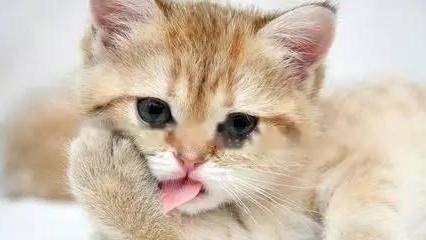Vitamins are a trace element that cats need. There are many types of vitamins, usually divided into fat-soluble vitamins and water-soluble vitamins. If cats are picky eaters or have an unbalanced diet, it is easy to cause vitamin deficiency. Let's talk about the different manifestations of various vitamin deficiency symptoms

1. Lack of fat-soluble vitamins
1. Lack Vitamin A: The main symptoms of vitamin A deficiency are: inflammation of the eyes and nose, swelling of the eyelids, decreased vision, bean curd-like discharge from the eyes, and sometimes the upper and lower eyelids stick together. Coat is loose and messy. Movement disorders. Some cats have dry eye disease, or a sunken eyeball on one side, but the eyeball has not been damaged, and the vision is still there. In severe cases, corneal perforation may occur, leading to the outflow of ocular fluid and blindness. Growth retardation or arrest occurs when kittens are vitamin A deficient.
2. Lack of vitamin D: The cat house is dark, the light is insufficient, the female cat is fed in a dark place for a long time, and the 7-dehydrocholesterol in the skin cannot be converted into vitamin D3, so vitamin D3 may occur in the milk. Serious deficiency of D, resulting in vitamin D deficiency in kittens; lack of light after weaning in kittens, and failure to supplement vitamin D in food is also an important factor in the occurrence of this disease. In addition, indigestion, difficulty in absorption, chronic enteritis, diarrhea, a large number of parasites, etc., can lead to the absorption of vitamin D and cause the disease. Heterophilia appears at the beginning of the disease, such as licking soil, walls, dirt or the abdomen of adjacent animals and itself. Slow growth of teeth or delayed tooth replacement. Joint pain gradually appeared, manifested as strong gait, lameness, difficulty in standing up, joint swelling and deformation; abnormal posture, showing O-shaped legs or X-shaped legs. Ribs and costal cartilage junctions are swollen and beaded, the sternum sinks, the vertebrae are curved, and the pelvis is narrowed; the maxilla is swollen, the mouth narrows, nasal congestion and breathing difficulties occur, and chew carefully and slowly. The sick cat is sluggish, likes to lie down and move, and gradually lose weight. In severe cases, lying on the ground can not stand up, and even the occurrence of bedsores, sepsis and so on.
3. Lack of vitamin E: Feed cats with foods lacking vitamin E for a long time, or feed too much unsaturated fatty acids and fish that have been refrigerated for too long, and meat will be Causes vitamin E deficiency. Vitamin E is also called tocopherol. When a cat is deficient in vitamin E, it can significantly affect the development of its sexual organs. If a female cat suffers from this disease, her placenta and fetal development during pregnancy will be affected, which can lead to empty pregnancy, miscarriage, and the death of kittens. Male cats are characterized by testicular hypoplasia and reduced or degenerated sperm. Sick cats have yellow fat disease, incomplete muscle tissue, etc.
4. Lack of vitamin K: The function of vitamin K is to promote the synthesis of prothrombin in the liver. If it is lacking, when bleeding, the blood is not easy to coagulate. Sick cats are prone to bleeding and do not clot easily.
2. Deficiency of water-soluble vitamins
Vitamin B deficiency is mainly due to long-term feeding of a single food, vitamin B deficiency, or intestinal This disease occurs when there is a disease in the tract, which destroys the synthesis and absorption of the intestinal tract, or increases the metabolic capacity and renal excretion.
1. Lack of vitamin B1: The viscera of some mollusks and fish contains thiamine enzyme that destroys vitamin B1. If cats are fed raw fish and mollusks for a long time, vitamin B1 deficiency can occur Symptoms; and long-term feeding of canned feed can also easily lead to this disease. In addition, female cats need a lot of vitamin b1 in late pregnancy, lactation and when they have high fever. If they are not supplemented in time, they are prone to this disease. Sick cats will experience loss of appetite, vomiting, dehydration, weight loss, and in severe cases, neuritis, cardiac dysfunction, convulsions, ataxia, paralysis, collapse, and finally death due to heart failure.
2. Lack of vitamin B2: sick cats have symptoms such as anorexia, weight loss, and hair loss. It is easy to suffer from conjunctivitis, corneal opacity (cataract in severe cases), hind limb muscle atrophy, and testicular hypoplasia in male cats. Severe cases died.
3. Lack of pantothenic acid: kittens grow slowly, dull coat, rough skin, gastrointestinal disorders and even gastrointestinal ulcers.
4. Lack of niacin: sick cats are prone to oral mucositis, ulcers, and foul odors in their breath.
5. Lack of vitamin B6: the sick cat suffers from weight loss, anemia, and irreversible kidney damage.
6. Lack of vitamin B12: lead to pernicious anemia.
7. Lack of folic acid: anorexia, weight loss, anemia, leukopenia, poor blood coagulation.
8. Lack of biotin: Squamous dermatitis occurs in the early stage, and weight loss and blood in the stool appear in the later stage.
9. Lack of vitamin C: The main reason for the lack of vitamin C in cats is the lack of vitamin C in the feed, or the inability to absorb vitamin C well in intestinal diseases. Affected cats showed loss of appetite, general weakness, flushing and edema of the oral mucosa, bleeding gums, followed by ulcers, some nosebleeds, and blood in the stool. Poor wound healing.
【Vitamin supplementation is very important】
Cats are deficient in vitamins, which can lead to illness in mild cases and death in severe cases. When some cats are sick, their owners do not understand One of the reasons, blindly to treat, in fact, in many cases is just a lack of vitamins. The owner should pay attention to the usual vitamin supplementation.
![[Dog Training 5] The training method of pet dog dining etiquette](/static/img/12192/12192_1.jpg)




